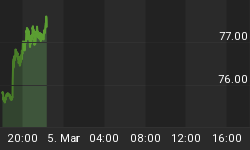Investors are currently receiving mixed messages regarding the ramifications resulting from the Fed's exit of debt monetization. Officials from the Federal Reserve are assuring market participants that there will be a smooth transition from the central bank's manipulation of long-term interest rates. But markets are reaching a completely different conclusion.
The major averages in the U.S. are unchanged so far this year and are not giving a clear signal as to the future condition of the economy. However, many other markets around the world are giving investors a clearer indication regarding the negative fallout from the ending of QE.
For example, if the rate of economic growth was indeed improving, as most pundits would have you believe, then why are stock markets in the former engines of global growth, like Brazil and China, faltering? The Brazil and Shanghai stock markets are both down 12% since May 22nd of 2013-the date former Fed Chairman Ben Bernanke first mentioned the tapering asset purchases. Emerging markets like Turkey have plummeted 34%, while the Lira is down 20%, since Bernanke first indicated the ending of QE was imminent. In addition, why has copper, one of the most important industrial commodities, dropped by 11 % in the last year if economic activity is about to enter into a protracted expansionary phase?
Most importantly, sovereign bond yields are falling across the globe at the same time credit spreads are rising. This is completely counterintuitive to the consensus that global growth is accelerating.
In the U.S., nominal debt levels are increasing substantially. Meanwhile, the Fed's purchases of Treasuries is headed towards 0%, from nearly 100% of all new debt issuance. In addition, the Fed is assuring markets that an inflation target of 2% and a real GDP growth level of 3% is going to be achieved in the near future. But the Ten-Year Note is currently yielding just 2.6%, and that yield is also falling. It is inconceivable to believe nominal GDP is going to be near 5%, while the Ten-Year Note is just half that level. This is even more incredulous given the historically-high deficits, which the Fed is supposedly ceasing to monetize.
The simple truth is the Fed's taper of asset purchases is going to lead to a collapse of stock and real estate values in the United States. And this will cause major turmoil in currencies, equities and interest rates across the globe.
International equity markets, commodity prices, credit spreads and bond yields are all clearly telling investors that global economic growth is anemic and contracting. Therefore, investors need to decide who they want to put their faith in; the promises from governments that have massively manipulated economies worldwide, or whatever is still left of the free-market.
Putting new money to work into stocks when the S&P 500 is near a record high (predominately through the use of a record amount of margin debt) is a dangerous game. This is especially true in light of the fact that earnings growth is built upon near-zero revenue growth and market cap growth is woefully unsupported by GDP growth.
The only viable conclusion to reach at this juncture is that the real money to be made in 2014 will be to position your investments to profit against a failed exit of QE by the Federal Reserve.















